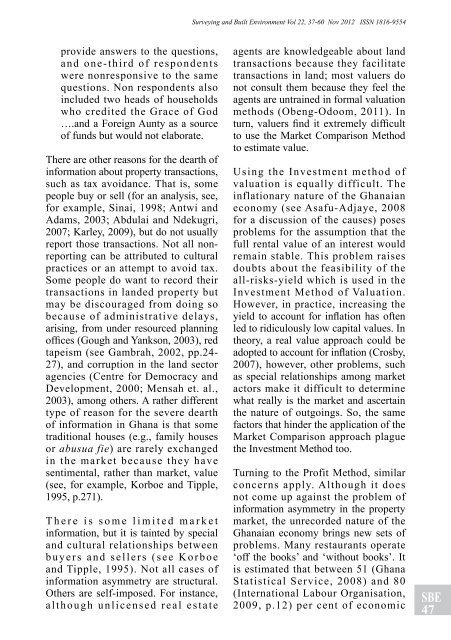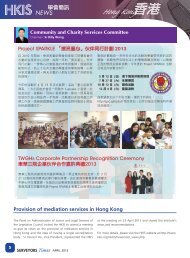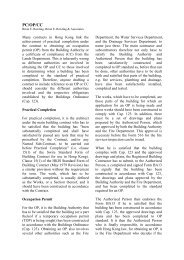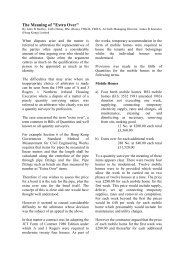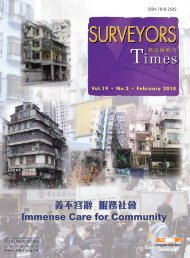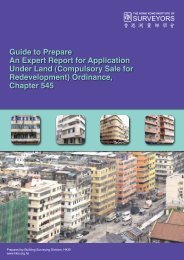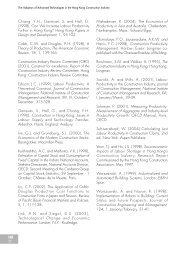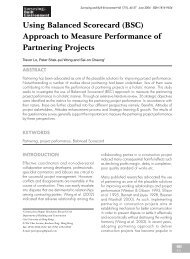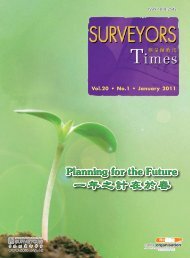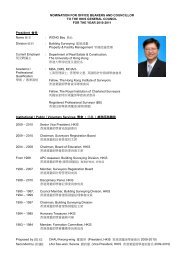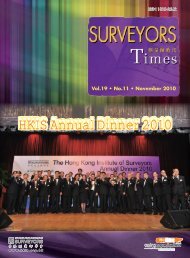Surveying & Built Environment Vol. 22 Issue 1 (December 2012)
Surveying & Built Environment Vol. 22 Issue 1 (December 2012)
Surveying & Built Environment Vol. 22 Issue 1 (December 2012)
Create successful ePaper yourself
Turn your PDF publications into a flip-book with our unique Google optimized e-Paper software.
provide answers to the questions,<br />
and one-third of respondents<br />
were nonresponsive to the same<br />
questions. Non respondents also<br />
included two heads of households<br />
who credited the Grace of God<br />
….and a Foreign Aunty as a source<br />
of funds but would not elaborate.<br />
There are other reasons for the dearth of<br />
information about property transactions,<br />
such as tax avoidance. That is, some<br />
people buy or sell (for an analysis, see,<br />
for example, Sinai, 1998; Antwi and<br />
Adams, 2003; Abdulai and Ndekugri,<br />
2007; Karley, 2009), but do not usually<br />
report those transactions. Not all nonreporting<br />
can be attributed to cultural<br />
practices or an attempt to avoid tax.<br />
Some people do want to record their<br />
transactions in landed property but<br />
may be discouraged from doing so<br />
because of administrative delays,<br />
arising, from under resourced planning<br />
offices (Gough and Yankson, 2003), red<br />
tapeism (see Gambrah, 2002, pp.24-<br />
27), and corruption in the land sector<br />
agencies (Centre for Democracy and<br />
Development, 2000; Mensah et. al.,<br />
2003), among others. A rather different<br />
type of reason for the severe dearth<br />
of information in Ghana is that some<br />
traditional houses (e.g., family houses<br />
or abusua fie) are rarely exchanged<br />
in the market because they have<br />
sentimental, rather than market, value<br />
(see, for example, Korboe and Tipple,<br />
1995, p.271).<br />
There is some limited market<br />
information, but it is tainted by special<br />
and cultural relationships between<br />
buyers and sellers (see Korboe<br />
and Tipple, 1995). Not all cases of<br />
information asymmetry are structural.<br />
Others are self-imposed. For instance,<br />
although unlicensed real estate<br />
<strong>Surveying</strong> and <strong>Built</strong> <strong>Environment</strong> <strong>Vol</strong> <strong>22</strong>, 37-60 Nov <strong>2012</strong> ISSN 1816-9554<br />
agents are knowledgeable about land<br />
transactions because they facilitate<br />
transactions in land; most valuers do<br />
not consult them because they feel the<br />
agents are untrained in formal valuation<br />
methods (Obeng-Odoom, 2011). In<br />
turn, valuers find it extremely difficult<br />
to use the Market Comparison Method<br />
to estimate value.<br />
Using the Investment method of<br />
valuation is equally difficult. The<br />
inflationary nature of the Ghanaian<br />
economy (see Asafu-Adjaye, 2008<br />
for a discussion of the causes) poses<br />
problems for the assumption that the<br />
full rental value of an interest would<br />
remain stable. This problem raises<br />
doubts about the feasibility of the<br />
all-risks-yield which is used in the<br />
Investment Method of Valuation.<br />
However, in practice, increasing the<br />
yield to account for inflation has often<br />
led to ridiculously low capital values. In<br />
theory, a real value approach could be<br />
adopted to account for inflation (Crosby,<br />
2007), however, other problems, such<br />
as special relationships among market<br />
actors make it difficult to determine<br />
what really is the market and ascertain<br />
the nature of outgoings. So, the same<br />
factors that hinder the application of the<br />
Market Comparison approach plague<br />
the Investment Method too.<br />
Turning to the Profit Method, similar<br />
concerns apply. Although it does<br />
not come up against the problem of<br />
information asymmetry in the property<br />
market, the unrecorded nature of the<br />
Ghanaian economy brings new sets of<br />
problems. Many restaurants operate<br />
‘off the books’ and ‘without books’. It<br />
is estimated that between 51 (Ghana<br />
Statistical Service, 2008) and 80<br />
(International Labour Organisation,<br />
2009, p.12) per cent of economic<br />
SBE<br />
47


